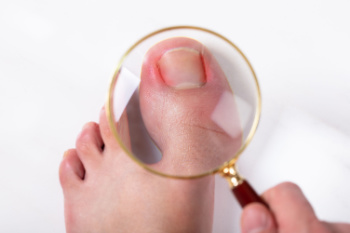
Ingrown toenails occur when the edges of the nail grow into the surrounding skin, often leading to pain, redness, swelling, and sometimes infection. This common condition typically affects the big toe and can result from improper nail trimming, wearing tight footwear, or injury. When an ingrown toenail becomes infected, it can cause increased pain and pus formation, making walking uncomfortable. To manage an infected ingrown toenail, it is important to keep the area clean and avoid tight shoes. Soaking the foot in warm, soapy water can help reduce inflammation and relieve discomfort. However, if symptoms persist or worsen, professional treatment is often necessary. A podiatrist can safely remove the ingrown portion of the nail and prescribe antibiotics if an infection is present. If you are struggling with an ingrown toenail, it is suggested you do not wait for it to worsen, but promptly schedule an appointment with a podiatrist for expert care and relief.
Ingrown toenails can become painful if they are not treated properly. For more information about ingrown toenails, contact Josef Elouze, DPM of Elite Podiatry. Our doctor can provide the care you need to keep you pain-free and on your feet.
Ingrown Toenails
Ingrown toenails occur when a toenail grows sideways into the bed of the nail, causing pain, swelling, and possibly infection.
Causes
- Bacterial infections
- Improper nail cutting such as cutting it too short or not straight across
- Trauma to the toe, such as stubbing, which causes the nail to grow back irregularly
- Ill-fitting shoes that bunch the toes too close together
- Genetic predisposition
Prevention
Because ingrown toenails are not something found outside of shoe-wearing cultures, going barefoot as often as possible will decrease the likeliness of developing ingrown toenails. Wearing proper fitting shoes and using proper cutting techniques will also help decrease your risk of developing ingrown toenails.
Treatment
Ingrown toenails are a very treatable foot condition. In minor cases, soaking the affected area in salt or antibacterial soaps will not only help with the ingrown nail itself, but also help prevent any infections from occurring. In more severe cases, surgery is an option. In either case, speaking to your podiatrist about this condition will help you get a better understanding of specific treatment options that are right for you.
If you have any questions please feel free to contact our office located in (Holiday City) Toms River, NJ . We offer the newest diagnostic and treatment technologies for all your foot and ankle needs.

